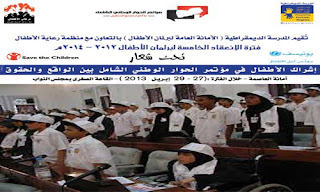Ahmed Awadh Bin Mubarak
 |
| Ahmed Awadh Bin Mubarak |
By Akram al-gaolahi
The General Secretary of the National Dialogue Conference (NDC) Ahmed Awadh Bin Mubarak, revealed the overall number of the withdrawing members since its beginning, ensuring that those whose withdrawals and apology were announced and accepted will be replaced.
“A number of parties and components, since the beginning of the NDC had replaced 21 of their members, whose attendance was impossible. The Islah replaced five of its members, the Unified popular Nasserite replaced two, the Socialist party replaced two and the Hirak “the “Southern Movement” replaced 12 of its members since the beginning of the conference, because some of those “Hirak” replaced never attended for reasons, including their being abroad and the impossibility of their attendance,” Bin Mubarak said in a press statement.
The NDC General Secretary explained that the seats will not remain vacant, because they affect the NDC quorum, which will start within the upcoming period discussion of decisions which will involve voting and attitudes from different forces, a matter that stipulates completion of the political components within the conference, adding that since the incidence of Sheikh Ahmed Bin Farid al-Surimah, only one member withdrew from NDC. It is Ali Yaslem Ba Oudah, adding that some of the media reports over withdrawals from NDC are exaggerated.
In a related issue some of the NDC members carried out a protesting stand to denounce the security disorder, witnessed by a number of Yemeni areas and Provinces, resulting in attacks against security and military members, the last of them being the martyrdom of the commander of the intelligence branch in Hadramout, Brigadier Ahmed Abdul-Razeq.
An NDC source said the members during their protesting stance called on the Reconciliation Government and the Security apparatus to take firm measures, so as to maintain the public tranquility, the state’s prestige and to strengthen security and stability in all Provinces.
The General Secretary of the National Dialogue Conference (NDC) Ahmed Awadh Bin Mubarak, revealed the overall number of the withdrawing members since its beginning, ensuring that those whose withdrawals and apology were announced and accepted will be replaced.
“A number of parties and components, since the beginning of the NDC had replaced 21 of their members, whose attendance was impossible. The Islah replaced five of its members, the Unified popular Nasserite replaced two, the Socialist party replaced two and the Hirak “the “Southern Movement” replaced 12 of its members since the beginning of the conference, because some of those “Hirak” replaced never attended for reasons, including their being abroad and the impossibility of their attendance,” Bin Mubarak said in a press statement.
The NDC General Secretary explained that the seats will not remain vacant, because they affect the NDC quorum, which will start within the upcoming period discussion of decisions which will involve voting and attitudes from different forces, a matter that stipulates completion of the political components within the conference, adding that since the incidence of Sheikh Ahmed Bin Farid al-Surimah, only one member withdrew from NDC. It is Ali Yaslem Ba Oudah, adding that some of the media reports over withdrawals from NDC are exaggerated.
In a related issue some of the NDC members carried out a protesting stand to denounce the security disorder, witnessed by a number of Yemeni areas and Provinces, resulting in attacks against security and military members, the last of them being the martyrdom of the commander of the intelligence branch in Hadramout, Brigadier Ahmed Abdul-Razeq.
An NDC source said the members during their protesting stance called on the Reconciliation Government and the Security apparatus to take firm measures, so as to maintain the public tranquility, the state’s prestige and to strengthen security and stability in all Provinces.















